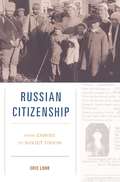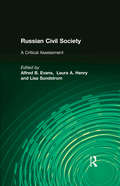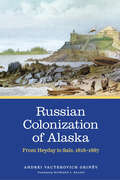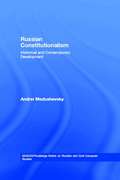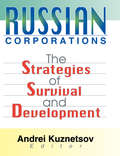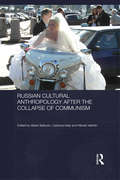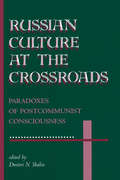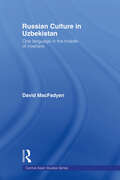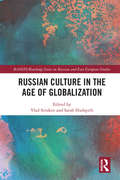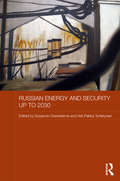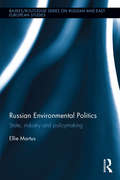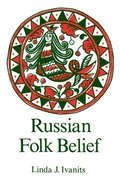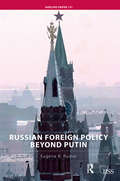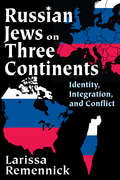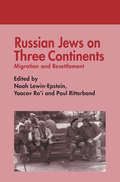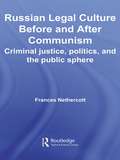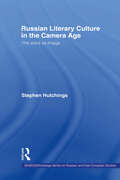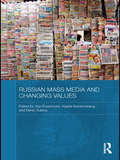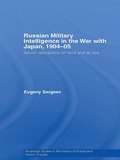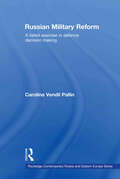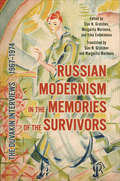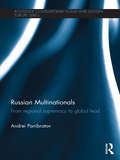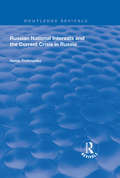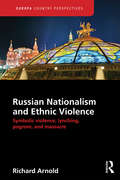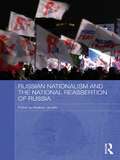- Table View
- List View
Russian Citizenship: From Empire To Soviet Union
by Eric LohrRussian Citizenship is the first book to trace the Russian state’s citizenship policy throughout its history. Focusing on the period from the mid-nineteenth century to the consolidation of Stalin’s power in the 1930s, Eric Lohr considers whom the state counted among its citizens and whom it took pains to exclude. His research reveals that the Russian attitude toward citizenship was less xenophobic and isolationist and more similar to European attitudes than has been previously thought-until the drive toward autarky after 1914 eventually sealed the state off and set it apart. Drawing on untapped sources in the Russian police and foreign affairs archives, Lohr’s research is grounded in case studies of immigration, emigration, naturalization, and loss of citizenship among individuals and groups, including Jews, Muslims, Germans, and other minority populations. Lohr explores how reform of citizenship laws in the 1860s encouraged foreigners to immigrate and conduct business in Russia. For the next half century, citizenship policy was driven by attempts to modernize Russia through intensifying its interaction with the outside world. But growing suspicion toward non-Russian minorities, particularly Jews, led to a reversal of this openness during the First World War and to a Soviet regime that deprived whole categories of inhabitants of their citizenship rights. Lohr sees these Soviet policies as dramatically divergent from longstanding Russian traditions and suggests that in order to understand the citizenship dilemmas Russia faces today-including how to manage an influx of Chinese laborers in Siberia-we must return to pre-Stalin history.
Russian Civil Society: A Critical Assessment
by Alfred B. Evans Laura A. Henry Lisa SundstromA vibrant civil society - characterized by the independently organized activity of people as citizens, undirected by state authority - is an essential support for the development of freedom, democracy, and prosperity. Thus it has been one important indicator of the success of post-communist transitions. This volume undertakes a systematic analysis of the development of civil society in post-Soviet Russia. An introduction and two historical chapters provide background, followed by chapters that analyze the Russian context and consider the roles of the media, business, organized crime, the church, the village, and the Putin administration in shaping the terrain of public life. Eight case studies then illustrate the range and depth of actual citizen organizations in various national and local community settings, and a concluding chapter weighs the findings and distills comparisons and conclusions.
Russian Colonization of Alaska: From Heyday to Sale, 1818–1867
by Andrei Val’terovich GrinëvIn this third volume of Russian Colonization of Alaska, Andrei Val&’terovich Grinëv examines the final period in the history of Russian America, from naval officers&’ coming to power in the colonies (1818) to the sale of Alaska to the United States (1867). During this time, in addition to the extraction of furs, other kinds of modern production continued to develop in Alaska, including shipbuilding, cutting and mining of timber and coal, and harvesting fish and ice for export. Grinëv&’s definitive volume explores how certain economic successes could not prevent the growth of crisis phenomena. Due to the low competitiveness of products and the distributive nature of the economy, the Russian colonial system could not compete with the dynamically developing Anglo-American capitalist colonization.Russian Colonization of Alaska is the first comprehensive study to analyze the origin and evolution of Russian colonization based on research into political economy, history, and ethnography. Grinëv&’s study elaborates the social, political, spiritual, ideological, personal, and psychological aspects of Russian America, and accounts for the idiosyncrasies of the natural environment, competition from other North American empires, Alaska Natives, and individual colonial diplomats. The colonization of Alaska, rather than being simply a continuation of the colonization of Siberia by Russians, was instead part of overarching Russian and global history.
Russian Constitutionalism: Historical and Contemporary Development (BASEES/Routledge Series on Russian and East European Studies #Vol. 28)
by Andrei MedushevskyMedushevsky examines constitutionalism in Russia from Tsarist times to the present. He traces the different attitudes to constitutionalism in political thought, and in practice, at different periods, showing how the balance between authoritarianism and liberalism has shifted. In addition, he discusses the importance of constitutional developments for societies in transition, and concludes that post-communist constitutional development in Russia is still far from complete. As an empirical resource, Russian Constitutionalism takes a longer historical view than other books on this topic, and it also goes further than this in its interpretive approach, providing a greater understanding of Russian constitutionalism.
Russian Corporations: The Strategies of Survival and Development
by Andrei KuznetsovDo you understand what it takes to conduct business successfully in the new Russia?The large-scale market reforms that revolutionized Russian business are now nearly a decade old. In this period, as editor Andrei Kuznetsov puts it, ”The Russian economy has acquired some intriguing characteristics that affect any firm or person wishing to do business in Russia. Most noticeable of them are the spread of barter transactions, a low level of investment activities, labor hoarding, and the importance of networks and unorthodox forms of corporate governance.” Russian Corporations: The Strategies of Survival and Development shows that while predictions of the quick development of a functional market economy in the new Russia have not, for the most part, come true, it is nevertheless possible, if one’s preconceptions are properly modified, to do business successfully there.In this timely and informative book you will find: information about the scale and scope of barter in the new Russia--how it works and why it is crucial to the survival of industry the pros and cons of insider shareholding in the new Russia the evolution of ownership structures and patterns of control in Russian firms a discussion of investment (and the lack of it) in Russian industry data about supplier/buyer relationship management in the regionInvestors, businesspeople, educators, and students will all find fascinating information in Russian Corporations: The Strategies of Survival and Development. This single source will bring you up to date on the theory and practice of corporate business in the new Russia.
Russian Cultural Anthropology after the Collapse of Communism (Routledge Contemporary Russia and Eastern Europe Series)
by Catriona Kelly Albert Baiburin Nikolai VakhtinIn Soviet times, anthropologists in the Soviet Union were closely involved in the state’s work of nation building. They helped define official nationalities, and gathered material about traditional customs and suitably heroic folklore, whilst at the same time refraining from work on the reality of contemporary Soviet life. Since the end of the Soviet Union anthropology in Russia has been transformed. International research standards have been adopted, and the focus of research has shifted to include urban culture and difficult subjects, such as xenophobia. However, this transformation has been, and continues to be, controversial, with, for example, strongly contested debates about the relevance of Western anthropology and cultural theory to post-Soviet reality. This book presents an overview of how anthropology in Russia has changed since Soviet times, and showcases examples of important Russian anthropological work. As such, the book will be of great interest not just to Russian specialists, but also to anthropologists more widely, and to all those interested in the way academic study is related to prevailing political and social conditions.
Russian Culture At The Crossroads: Paradoxes Of Postcommunist Consciousness
by Dmitri N ShalinThe reexamination of values that began during the USSRs last years continues today in the search for a new Russian culture, one rooted in the pre-Soviet past but dynamic and evolving. Multi-textual, polyphonic, and contradictory, the current Russian cultural discourse is richly reflected in these essays by a diverse group of authors from Russian and American academic and cultural circles. The chapters explore specific cultural domains, surveying Russian and Soviet beliefs and behaviors, and highlighting the range of choices that Russians are facing at this critical juncture. }During the waning years of Soviet power, glasnost laid bare the distress of people trapped in a system they despised but felt powerless to change. The reexamination of values that began then continues today in the search for a new Russian culture, one rooted in the pre-Soviet past but dynamic and evolving, enabling Russians to meet the challenges they face in the contemporary world. Multi-textual, polyphonic, and contradictory, the current Russian cultural discourse is richly reflected in these essays by a diverse group of authors from Russian and American academic and cultural circles. Each chapter focuses on a particular cultural domain, surveying the historical origins of Russian beliefs and behaviors, exploring their Soviet and post-Soviet permutations, and highlighting the range of choices that Russians are facing at this critical juncture. The decisions they make will shape their society and culture for generations to come.Illuminating the universal significance of the Soviet experience, this volume raises provocative questions about the social, political, and economic sources of cultural change.
Russian Culture in Uzbekistan: One Language in the Middle of Nowhere (Central Asian Studies)
by David MacFadyenRecent political changes in Central Asia, where the United States is replacing Russia as the dominant power, are having a profound effect on Russian speakers in the region. These people, formerly perceived as progressive and engaging with Europe, are now confronted by the erasure of their literary, musical, cinematic and journalistic culture, as local ethnic and American cultures become much stronger. This book examines the predicament of Russian culture in Central Asia, looking at literature, language, cinema, music, and religion. It argues that the Soviet past was much more complex than the simplified, polarised rhetoric of the Cold War period and also that the present situation, in which politicians from the former Soviet regime often continue in power, is equally complex.
Russian Culture in the Age of Globalization (BASEES/Routledge Series on Russian and East European Studies)
by Vlad Strukov Sarah HudspithThis book brings together scholars from across a variety of disciplines who use different methodologies to interrogate the changing nature of Russian culture in the twenty-first century. The book considers a wide range of cultural forms that have been instrumental in globalizing Russia. These include literature, art, music, film, media, the internet, sport, urban spaces, and the Russian language. The book pays special attention to the processes by which cultural producers negotiate between Russian government and global cultural capital. It focuses on the issues of canon, identity, soft power and cultural exchange. The book provides a conceptual framework for analyzing Russia as a transnational entity and its contemporary culture in the globalized world.
Russian Energy and Security up to 2030: Russian Energy And Security Up To 2030 (Routledge Contemporary Russia and Eastern Europe Series)
by Susanne Oxenstierna Veli-Pekka TynkkynenThe challenges in Russia’s energy sector are changing. On the demand side, Europe is seeking to limit its dependence on Russian oil and gas, with the result that China and other Asian countries are likely to eventually become growing export markets for Russian energy. On the supply side, oil and gas fields in West Siberia are diminishing and in future Russia’s energy will have to come more from East Siberia and the Arctic, which will necessitate new infrastructure development and the employment of advanced technologies, which may increase Russia’s dependence on commercial partners from outside Russia. This book explores the challenges facing Russia’s energy sector and the resulting security implications. It includes a discussion of how far the Russian state is likely to continue to monopolise the energy sector, and how far competition from private and foreign companies might be allowed.
Russian Environmental Politics: State, Industry and Policymaking (BASEES/Routledge Series on Russian and East European Studies)
by Ellie MartusProtecting the environment is a key issue for Russia, with its vast wilderness areas and its economy’s reliance on extractive industries, which have the potential to cause massive pollution. This book explores how policymaking works in Russia, focusing on the important field of environmental policy. It argues that, contrary to the prevailing view that the presidency dominates the policy process, with Putin making all major decisions or at least being the arbiter between conflicting parties, policy is in fact made a range of competing interests including the bureaucracy and influential industry and industrial association lobbyists, with relatively little intervention from Putin. The book shows how, although Russia does not have a strong civil society, environmentalist views are represented through the institutionalized bureaucracy. The book concludes that policy decision making in Russia is quite dispersed and not overcentralized.
Russian Folk Belief
by Linda J. IvanitsA scholarly work that aims to be both broad enough in scope to satisfy upper-division undergraduates studying folk belief and narrative and detailed enough to meet the needs of graduate students in the field. Each of the seven chapters in Part 1 focuses on one aspect of Russian folk belief, such as the pagan background, Christian personages, devils and various other logical categories of the topic. The author's thesis - that Russian folk belief represents a "double faith" whereby Slavic pagan beliefs are overlaid with popular Christianity - is persuasive and has analogies in other cultures. The folk narratives constituting Part 2 are translated and include a wide range of tales, from the briefly anecdotal to the more fully developed narrative, covering the various folk personages and motifs explored in Part 1.
Russian Foreign Policy Beyond Putin (Adelphi Ser.)
by Eugene B. RumerRussia‘s resurgence as an assertive actor in the global diplomatic arena after a long period of introspection and preoccupation with domestic troubles, and the economic revival that underpins it, are among the most striking developments in international relations of recent years. But what drives Russian foreign policy at the end of the Putin era? To what extent is it shaped by Russia‘s role as a major energy supplier, and how long can the country remain anenergy superpower if indeed it is one? How might Russian foreign policy change in the years ahead? Which way will Russia, faced with the might of growing powers around it, and struggling with the fragility of its economic success and stability at home, choose to face in international relations? This Adelphi Paper examines the domestic context of contemporary Russian foreign policy and its key political, economic, military and security drivers, as well as looking at the contrasting outlook that preceded it, and at how Russia‘s international posture may adjust again in the coming years. It concludes with recommendations for Western policy makers on how to respond to Russia‘s return.
Russian Jews on Three Continents: Identity, Integration, and Conflict
by Larissa RemennickIn the early 1990s, more than 1.6 million Jews from the former Soviet Union emigrated to Israel, the United States, Canada, Germany, and other Western countries. Larissa Remennick relates the saga of their encounter with the economic marketplaces, lifestyles, and everyday cultures of their new homelands, drawing on comparative sociological research among Russian-Jewish immigrants.Although citizens of Jewish origin ostensibly left the former Soviet Union to flee persecution and join their co-religionists, Israeli, North American, and German Jews were universally disappointed by the new arrivals' tenuous Jewish identity. In turn, Russian Jews, whose identity had been shaped by seventy years of secular education and assimilation into the Soviet mainstream, hoped to be accepted as ambitious and hard working individuals seeking better lives. These divergent expectations shaped lines of conflict between Russian-speaking Jews and the Jewish communities of the receiving countries.Since her own immigration to Israel from Moscow in 1991, Remennick has been both a participant and an observer of this saga. This is the first attempt to compare resettlement and integration experiences of a single ethnic community (former Soviet Jews) in various global destinations. It also analyzes their emerging transnational lifestyles. Written from an interdisciplinary perspective, this book opens new perspectives for a diverse readership, including sociologists, anthropologists, political scientists, historians, Slavic scholars, and Jewish studies specialists.
Russian Jews on Three Continents: Migration and Resettlement
by Yaacov Ro'I Noah Lewin-Epstein Paul RitterbandIn the past twenty years almost three quarters of a million Russian Jews have emigrated to the West. Their presence in Israel, Europe and North America and their absence from Russia have left an indelible imprint on these societies. The emigrants themselves as well as those who stayed behind, are in a struggle to establish their own identities and to achieve social and economic security In this volume an international assembly of experts historians, sociologists, demographers and politicians join forces in order to assess the nature and magnitude of the impact created by this emigration and to examine the fate of those Jews who left and those who remained. Their wide-ranging perspectives contribute to creating a variegated and complex picture of the recent Russian Jewish Emigration.
Russian Legal Culture Before and After Communism: Criminal Justice, Politics and the Public Sphere (BASEES/Routledge Series on Russian and East European Studies)
by Frances NethercottFollowing the emancipation of the serfs in 1861, and again during the Gorbachev and Yel’tsin eras, the issue of individual legal rights and freedoms occupied a central place in the reformist drive to modernize criminal justice. While in tsarist Russia the gains of legal scholars and activists in this regard were few, their example as liberal humanists remains important today in renewed efforts to promote juridical awareness and respect for law. A case in point is the role played by Vladimir Solov’ev. One of Russia’s most celebrated moral philosophers, his defence of the ‘right to a dignified existence’ and his brilliant critique of the death penalty not only contributed to the development of a legal consciousness during his lifetime, but also inspired appeals for a more humane system of justice in post-Soviet debate. This book addresses the issues involved and their origins in late Imperial legal thought. More specifically, it examines competing theories of crime and the criminal, together with various prescriptions for punishment respecting personal inviolability. Charting endeavours of the juridical community to promote legal culture through reforms and education, the book also throws light on aspects of Russian politics, society and mentality in two turbulent periods of Russian history.
Russian Literary Culture in the Camera Age: The Word as Image (BASEES/Routledge Series on Russian and East European Studies #Vol. 14)
by Stephen HutchingsThis book explores how one of the world's most literary-oriented societies entered the modern visual era, beginning with the advent of photography in the nineteenth century, focusing then on literature's role in helping to shape cinema as a tool of official totalitarian culture during the Soviet period, and concluding with an examination of post-Soviet Russia's encounter with global television. As well as pioneering the exploration of this important new area in Slavic Studies, the book illuminates aspects of cultural theory by investigating how the Russian case affects general notions of literature's fate within post-literate culture, the ramifications of communism's fall for media globalization, and the applicability of text/image models to problems of intercultural change.
Russian Mass Media and Changing Values (Routledge Contemporary Russia and Eastern Europe Series)
by Arja RosenholmThis book provides a multi-faceted picture of the many complex processes taking place in the field of contemporary Russian media and popular culture. Russian social and cultural life today is strongly individualised and consumers are offered innumerable alternatives; but at the same time options are limited by the new technologies of control which are a key feature of Russian capitalism. Based on extensive original research by scholars in both Russia itself and in Finland, the book discusses new developments in the media industry and assesses a wide range of social and cultural changes, many of which are related to, and to an extent generated by, the media. The book argues that the Russian mass media industry, whilst facing the challenges of globalization, serves several purposes including making a profit, reinforcing patriotic discourse and popularizing liberalized lifestyles. Topics include changing social identities, new lifestyles, ideas of "glamour" and "professional values". Overall, the book demonstrates that the media in Russia is far from homogenous, and that, as in the West, despite new technologies of control, media audiences are being offered a new kind of pluralism which is profoundly influencing Russia's cultural, social and political landscape.
Russian Military Intelligence in the War with Japan, 1904-05: Secret Operations on Land and at Sea (Routledge Studies in the History of Russia and Eastern Europe #Vol. 7)
by Evgeny SergeevExamining Russian military intelligence in the war with Japan of 1904-05, this book, based on newly-accessible documents from the tsarist era military, naval and diplomatic archives, gives an overview of the origins, structure and performance of Russian military intelligence in the Far East at the turn of the twentieth century, investigating developments in strategic and tactical military espionage, as well as combat renaissance. It provides a comprehensive reappraisal of the role of military intelligence in the years immediately preceding the First World War, by comparing the Russian military secret services to those of the other great powers, including Britain, Germany, France and Japan.
Russian Military Reform: A Failed Exercise in Defence Decision Making (Routledge Contemporary Russia and Eastern Europe Series)
by Carolina Vendil PallinThis book examines reform of the Russian military since the end of the Cold War. It explores the legacy of the Soviet era, explaining why - at the time of the fall of the Soviet Union - radical reform was long overdue in the wake of changing military technology, new economic and political realities, and the emergence of new threats and challenges. It discusses the problems encountered by Gorbachev in his attempts to promote military reform in the late 1980s, and goes on to analyse in detail the mixed fortunes of the policies of his successors, Yeltsin and Putin. It describes how the onset of war in Chechnya in 1994 provided clear evidence of the weaknesses of the Russian military in modern conflicts, and shows that although the Chechnya debacle did provide some impetus for reforms in the armed forces in 1997-98, the momentum was not continued under the Putin government. It argues that Putin’s policies of bolstering central control over all aspects of decision making has left untouched many key problems facing the Russian military, including infighting between different force structures, lack of transparency and independent scrutiny over defence spending, and absence of consensus on the main threats to Russia and optimum force posture. Moreover, it argues that in his attempts to concentrate all means of control to a corrupt and inefficient Kremlin bureaucracy, Putin has deprived himself of all alternative channels of independent scrutiny, control and oversight, thus exacerbating the problems that continue to plague the Russian military.
Russian Modernism in the Memories of the Survivors: The Duvakin Interviews, 1967–1974
by Margarita Marinova Slav N. GratchevIn the late 1960s and early 1970s, Soviet philologist, literary dissident, and university professor Viktor Duvakin made it his mission to interview the members of the artistic avant-garde who had survived the Russian Revolution, Stalin’s purges, and the Second World War. Based on archival materials held at the Moscow State University Library, Russian Modernism in the Memories of the Survivors catalogues six interviews conducted by Duvakin. The interviewees talk about their most intimate life experiences and give personal accounts of their interactions with famous writers and artists such as Vsevolod Meyerhold, Sergei Eisenstein, and Marina Tsvetaeva. They offer insights into the world of Russian emigrants in Prague and Paris, the uprising against the Communist government, what it was like to work at the United Nations after the Second World War, and other important aspects of life in the Soviet Union and Europe during the first half of the twentieth century. Archival photographs, as well as hundreds of annotations to the text, are included to help readers understand the historical and cultural context of the interviews. The unique and previously unpublished materials in Russian Modernism in the Memories of the Survivors will be of great interest to anyone who wants to learn more about this fascinating period in Soviet history.
Russian Multinationals: From Regional Supremacy to Global Lead (Routledge Contemporary Russia and Eastern Europe Series)
by Andrei PanibratovRussian multinationals are playing an increasingly important role in the world economy, particularly in some key sectors such as oil, gas and metallurgy. At the same time, Russian multinationals differ in many respects from multinationals from other countries in that they often receive special treatment from the Russian government, and, because of past experiences, international investors are often reluctant to invest in them. This book presents a comprehensive overview of Russian multinationals. It discusses the rise of Russian multinationals, examines Russian multinationals' activities in key sectors, analyses the relationship between Russian multinationals and the Russian government and between Russian multinationals and international investors, and concludes by assessing how Russian multinationals are likely to develop in future.
Russian National Interests and the Current Crisis in Russia (Routledge Revivals)
by Henry TrofimenkoFirst published in 1999, this book analyses the national interests of Russia as thy are indicated by the current policies of the Russian government and formulated in public and not so public discussions in high echelons of government. The author not only sums up and critically reviews those interests in general, but gives detailed analysis of specific interests of Russia in Europe, Asia and the Middle East. A large chapter is devoted to the review of converging and diverging interests of the USA and Russia. The main value of the book is in its philosophical aspect. An outstanding Russian foreign policy expert, who for 20 years participated in inner debates on a high level on issues of Soviet foreign policy and was considered by US politicians and scholars to be one of the top experts in Moscow on the US foreign policy and military strategy, muses over the fate of Russia and its current foreign policy (and domestic) predicaments.
Russian Nationalism and Ethnic Violence: Symbolic Violence, Lynching, Pogrom and Massacre (Europa Country Perspectives)
by Richard ArnoldNationalism is now the dominant narrative in Russian politics, and one with genuine popularity in society. Russian Nationalism and Ethnic Violence is a theoretical and empirical study which seeks to break the concept of "ethnic violence" into distinguishable types, examining the key question of why violence within the same conflict takes different forms at certain times and providing empirical insight into the politics of one of the most important countries in the world today. Theoretically, the work promises to bring the content of ethnic identity back into explanations of ethnic violence, with concepts from social theory, and empirical and qualitative analysis of databases, newspaper reports, human rights reports, social media, and ethnographic interviews. It sets out a new typology of ethnic violence, studied against examples of neo-Nazi attacks, Cossack violence against Meskhetian Turks, and Russian race riots. Russian Nationalism and Ethnic Violence brings hate crimes in Russia into the study of ethnic violence and examines the social undercurrents that have led to Putin’s embrace of nationalism. It adds to the growing body of English language scholarship on Russia’s nationalist turn in the post-Cold War era, and will be essential reading for anyone seeking to understand not only why different forms of ethnic violence occur, but also the potential trajectory of Russian politics in the next 20 years.
Russian Nationalism and the National Reassertion of Russia (Routledge Contemporary Russia and Eastern Europe Series)
by Marlene LaruelleMilitary action in South Ossetia, growing tensions with the United States and NATO, and Russia's relationship with the European Union demonstrate how the issue of Russian nationalism is increasingly at the heart of the international political agenda.This book considers a wide range of aspects of Russian nationalism, focussing on the Putin period. It discusses the development of Russian nationalism, including in the Soviet era, and examines how Russian nationalism grows out of – or is related to – ideology, culture, racism, religion and intellectual thinking, and demonstrates how Russian nationalism affects many aspects of Russian society, politics and foreign policy. This book examines the different socio-political phenomena which are variously defined as ‘nationalism’, ‘patriotism’ and ‘xenophobia’. As Russia reasserts itself in the world, with Russian nationalism as one of the key driving forces in this process, an understanding of Russian nationalism is essential for understanding the dynamics of contemporary international relations.
